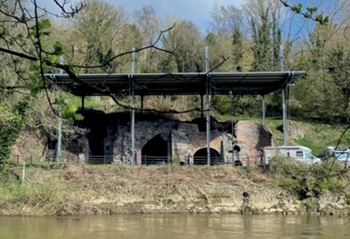DuraKerb
July 29 marked Earth Overshoot Day in 2019, the calculated date when resource consumption for the year exceeded what the Earth can regenerate, replenish and renew in that year. To lessen the detrimental consequences of ecological overshoot, sustainability-focused companies are providing innovative solutions that support the drive towards a circular economy.
This date in 2019 was the earliest it has fallen since the world passed the critical threshold in the 1970s, with the UK’s country-specific day in 2019 being May 17.
The construction industry is facing pressure for rapid change. The construction industry uses more than 400 million tonnes of material a year according to a report by the UK Green Building Council [1], much of which has a negative impact on the environment. Furthermore, The National Building Specification stated that of that 400 million, 15% goes straight into landfill simply through over ordering, misordering or breakages [2].
Cement is the most widely used man-made material after water, responsible for around 8% of the world’s carbon dioxide emissions [3]. With cement a key ingredient in concrete used for traditional kerbing, some products such as Econpro DuraKerb are designed to help reduce levels of waste disposal, but also help reduce the output of cement and the carbon emissions linked to its production. Compared to its precast concrete counterpart, DuraKerb is claimed to have saved approximately 12,000,000 kgs of emitted carbon as well as removed 1,000 articulated vehicles in transport due to the lightweight nature of the product.
Phil Sutton, Managing Director at Econpro, commented: “We are building an overwhelmingly large ecological debt more rapidly than ever before, so there has never been a more crucial time to revolutionise the ways in which we create and consume. Solving the waste disposal problem through innovative recycling techniques that reduce carbon emissions is at the very core of what we do, and what makes us strive harder every day to develop functional products and preserve natural resources. No doubt there’s a long way to go across the whole world, but Econpro is proud to be a company moving towards a circular economy and leading substantial change in the way we dispose, reuse and recycle.”
Durakerb – part of the Econpro Group that transform waste and by-products into sustainable products and solutions – says that alternatives to traditional concrete road kerbs are essential for highway and construction companies looking to reduce the number of accidents at work.
Regular lifting and carrying of considerable loads are a common cause of musculoskeletal problems in construction workers; the HSE reported an average of 2,310 workers per 100,000 in the UK building industry suffering work-related musculoskeletal disorders between 2015 and 2018. Concrete blocks can be difficult to carry manually, so Durakerb has developed an alternative, composed of 88% recycled polymer, which is far lighter.
Each Durakerb unit is made from the equivalent of 182 recycled plastic bottles and weighs only 6kg. It can be cut with a hand saw and installed manually. In contrast, a traditional concrete kerb can be more than 90% heavier and well-maintained lifting equipment is necessary. Further supervision is also needed as power tools are required to cut the concrete to the correct size.
The installation of concrete kerbs, which usually require the use of heavy cutting tools, generates a high level of risk of airborne silica. The HSE’s cancer burden study estimates that 600 people die a year from lung cancer associated with exposure to respirable crystalline silica (RCS), with 450 of these occurring from exposure in the construction sector. Recycled plastic kerbs, on the other hand, contains no carcinogenic RCS, meaning workers are safe from lung conditions.
Durakerb products can be manually installed in line with the HSE guidelines benefiting the workforce and project managers by reducing working time on live networks by up to 75%, as well as the number of injuries and lost working days.
Phil Sutton, Managing Director at Econpro, said: “The installation of Durakerb is safe and easy for workers as the product’s lightweight nature and absence of carcinogenic silica mean installation is less risky than traditional concrete, preventing costly and dangerous accidents at work. Since its inception, Durakerb has long been recognised for its safety benefits having been awarded the Institution of Highways & Transportation Health & Safety at Work Award back in 2008.”
To find out more about Durakerb go to: http://www.durakerb.co.uk/about-durakerb/
[edit] Related articles on Designing Buildings Wiki
- Biomaterial.
- BREEAM.
- BREEAM Responsible sourcing of materials.
- Circular economy.
- Carbon footprint.
- Deleterious materials.
- Embodied energy.
- End of life potential.
- Green Guide to Specification.
- Kevin McCloud's 'Green Heroes' 2019
- Life cycle assessment.
- Material procurement.
- Natural resource.
- Recyclable construction materials.
- Sustainability.
[edit] External references
- [1] https://www.ukgbc.org/wp-content/uploads/2018/03/UK-GBC-Leading-the-way.pdf
- [2] https://www.thenbs.com/knowledge/construction-waste-and-sustainability
- [3] https://reader.chathamhouse.org/making-concrete-change-innovation-low-carbon-cement-and-concrete#
- http://www.hse.gov.uk/statistics/causdis/msd.pdf
- http://www.hse.gov.uk/aboutus/occupational-disease/cancer/silica.htm
Featured articles and news
Art of Building CIOB photographic competition public vote
The last week to vote for a winner until 10 January 2025.
The future of the Grenfell Tower site
Principles, promises, recommendations and a decision expected in February 2025.
20 years of the Chartered Environmentalist
If not now, when?
Journeys in Industrious England
Thomas Baskerville’s expeditions in the 1600s.
Top 25 Building Safety Wiki articles of 2024
Take a look what most people have been reading about.
Life and death at Highgate Cemetery
Balancing burials and tourism.
The 25 most read articles on DB for 2024
Design portion to procurement route and all between.
The act of preservation may sometimes be futile.
Twas the site before Christmas...
A rhyme for the industry and a thankyou to our supporters.
Plumbing and heating systems in schools
New apprentice pay rates coming into effect in the new year
Addressing the impact of recent national minimum wage changes.
EBSSA support for the new industry competence structure
The Engineering and Building Services Skills Authority, in working group 2.
Notes from BSRIA Sustainable Futures briefing
From carbon down to the all important customer: Redefining Retrofit for Net Zero Living.
Principal Designer: A New Opportunity for Architects
ACA launches a Principal Designer Register for architects.




















